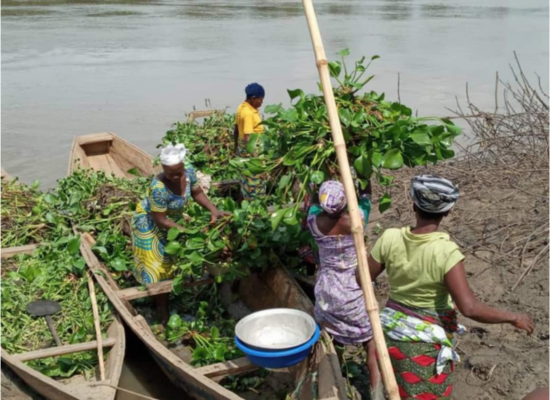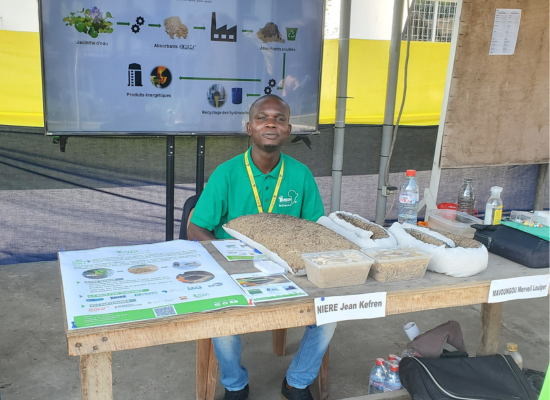Turning a local curse into a global blessing
Divin Kouebatouka, now founder and CEO of Green Tech Africa, grew up living with his mother in a small village in Congo-Brazzaville, a small community relying on fishing as its main economic resource. However, the inhabitants were facing an environmental crisis caused by the water hyacinth. This aquatic plant, despite its aesthetic appearance and purple flowers, is everything but benign: it is a highly invasive exogenous species, that tends to cover the vast majority of a lake quickly, making fishing and navigation over water difficult. Additionally, the plant absorbs oxygen from the water and prevents the reproduction of certain fish. Like algae, the plant creates a layer of the surface of the water, blocking sunlight and making it harder for aquatic plants to produce oxygen and affecting life below water. This multiangled attack on the ecosystem eventually leads to the collapse of the later.
As if that was not enough, the water hyacinth presents the ideal breeding ground for another invasive species: malaria-transmitting mosquitoes, leading to increased health risks for local populations. Locals from Divin´s village even referred to the plant as a "curse".
“Witnessing firsthand how this environmental problem was destroying livelihoods and ecosystems, I was motivated to find a sustainable solution”
”, explains Divin. He decided to study the properties of water hyacinth. Through research and experimentation, he discovered that the plant has remarkable pollutant absorption properties. This insight sparked the idea to transform the invasive plant from a harmful nuisance into a valuable resource capable of addressing another pressing environmental issue: industrial pollution caused by uncontrolled oil spills in Congo and other African countries. As an oil-producing OPEC member with frequent oil spills local populations are exposed to high industrial pollution, as well as contaminated soil, groundwater, lakes, seas, and oceans, leading to long-term environmental degradation and severely impacted quality of life.Divin’s background as a green technology specialist and his experience with renewable energy and environmental consulting helped him to create a natural absorbent made from water hyacinth to remediate pollution on soil and water surfaces. With this product, Divin succeeded turning a local environmental "curse" into an inclusive economic opportunity through sustainable chemistry and green technology, addressing both invasive species management and industrial pollution remediation. Green Tech Africa launched in March 2020, with a mission to address environmental pollution through innovative, sustainable solutions rooted in green technology and biotechnology.
Now, the start-up is led by a multidisciplinary team of experts with strong backgrounds in engineering, sustainable development, business, and law. The team currently consists of eight key members, each bringing specialized skills to drive the company’s mission of developing sustainable, innovative environmental solutions.
The challenges the young company had to face mainly derive from the complexity of the endeavour to combine environmental restoration with sustainable industrial solutions in a developing context. Designing and producing a 100% organic absorbent fibre that is efficient, certified, patented, and customizable involves complex biotechnological and industrial processes. Additionally, introducing innovative green products to traditional industries such as oil, construction and exploitation requires building trust, demonstrating efficacy, and overcoming resistance to change.
The name Green Tech Africa reflects the core mission and vision of the startup: “Green” emphasizes the company’s commitment to environmentally friendly, sustainable solutions that protect and restore natural ecosystems. "Tech" highlights the use of advanced technology, biotechnology, and innovative scientific methods to tackle environmental challenges. “Africa” signifies the company’s roots and focus on addressing pressing ecological and socio-economic issues specific to African communities, particularly in Congo Brazzaville and surrounding regions. Together, the name conveys a powerful message: leveraging green technology to create sustainable, impactful solutions that benefit Africa’s environment and its people.
Fighting one curse with another
Green Tech Africa’s innovation centres on transforming the invasive water hyacinth, a major environmental plague. By harvesting and processing this plant, Green Tech Africa tackles the environmental problem at its root while creating value for an effective, sustainable solution for managing industrial pollution, particularly oil spills. The proprietary technology and business model revolve around KUKIA®, a 100% organic absorbent fibre derived from harvested water hyacinth. Unlike conventional synthetic absorbents on the market, this product can absorb up to 17 times its weight in petroleum-based pollutants, making it highly efficient for cleaning oil spills on water and land.
Green Tech Africa collects water hyacinth from affected coastal communities, involving local women’s groups and creating social impact through job creation. Used KUKIA® absorbents are collected and repurposed as biofuel for cement kilns, closing the loop and promoting a circular economy. The solution helps restore aquatic ecosystems, improve water quality, and protect biodiversity. The model is replicable across African countries facing similar environmental challenges.
Additionally, Green Tech Africa’s model goes beyond product provision by offering expertise advice, training, and ecological cleaning services that emphasize prevention, effective leak management, and bioremediation. This holistic approach ensures long-term environmental compliance and restoration rather than temporary fixes.
While Green Tech Africa has made significant progress in turning water hyacinth into an effective, sustainable absorbent product (KUKIA®) for industrial pollution control, some challenges remain to be fully solved. These include scaling up production and distribution to meet growing demand across multiple African countries, ensuring consistent quality and supply of raw water hyacinth amid seasonal and ecological variations, and overcoming initial market hesitations from industrial clients unfamiliar with bio-based alternatives. Additionally, continuous research and development are needed to expand the range of products and applications, improve absorption efficiency further, and optimize the recycling of used absorbents into biofuels.
"While the core technology exists and is patented, advancing these operational, market, and technological aspects will be critical to fully realizing the innovation’s potential and replicability at larger scales"
, explains Divin. Next up at Green Tech Africa
Green Tech Africa’s current focus is on expanding and scaling up its innovative environmental solutions by establishing a more efficient production unit to increase capacity and comply with industry and state standards. The start-up aims to boost its social impact, enhance brand awareness and to invest in research and development to launch a new product: 100% biodegradable bioplastic bags derived from water hyacinth, supporting both growth and diversification while reinforcing the company’s mission to transform an invasive plant into eco-friendly, high-value products that address pollution and empower communities.
Green Tech Africa’s future projects and next steps focus on scaling up production and expanding market reaching through the implementation of the continent’s first biorefinery for invasive plants. This biorefinery will transform water hyacinth biomass into energy such as biogas and a variety of products. The start-up will also expand exports by testing and establishing buffer stocks in neighbouring countries like Gabon, the Democratic Republic of Congo, and Angola, as well as international markets like France, UK, USA and Germany aiming to grow distribution across the sub-region. Additionally, the company will develop composting solutions to improve soil fertility and provide expertise consulting, bioremediation, ecological cleanup, and training services for industrial clients.
With their innovative approach, Green Tech Africa, who joined the ISC3 Global Start-up Service as one of the winners of the African Climate Innovation Challenge (ACIC) 2024, actively contributes to SDG1 (No Poverty), SDG5 (Gender Equality), SDG6 (Clean Water and Sanitation), SDG8 (Decent Work and Economic Growth, SDG12 (Responsible Consumption and Production), SDG13 (Climate Action), SDG15 (Life on Land).




